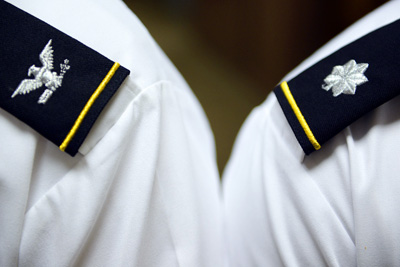By C. Todd Lopez
WASHINGTON (May 13, 2013) -- This September, field grade officers who want to be considered for command positions and key billets will have to actively make it known they wish to compete. Unlike in years past, they will no longer be passively entered into competition for these important Army leadership positions.
The Army has changed how lieutenant colonels and colonels participate in the "Brigade and Battalion Command Centralized Selection List" system. Officers now must "opt in" to participate.

"You want officers that are committed to leading our formations, have thought through those challenges, and have a desire to command," said Col. Robert C. Doerer, the director of the Officer Personnel Management Directorate, about the change.
The Senior Leader Development Division and Army Human Resources Command work with Army commands to determine what the requirements are for command and key billet positions. Once those needs have been assessed, the Army holds Centralized Selection List, or CSL, boards to fill those positions using eligible Army officers.
For lieutenant colonels, the three boards they can participate in -- the maneuver, fires and effects board; the force sustainment board; and the operational support board -- are held in September. For colonels, three similar boards are held in January.
The changes affect how eligible officers will make themselves counted among those considered for participation in the upcoming fiscal year 2015 centralized selection list boards and for those in coming years.
The Army's Human Resources Command has what's called a "command preference designator." For the fiscal year 2014 CSL boards and for those held in years past, officers logged into that computer system and chose which "subcategories" of command they wished to compete for, Doerer said. If they didn't log into the system at all, they would then automatically be competed in every subcategory of command. Not logging in was akin to selecting to compete in every category.
With the new "opt-in" change implemented for the first of the fiscal year 2015 boards, coming in September, officers who don't log into the system won't compete at all. If they want to compete, they will need to log in and let the Army know their wishes.
Another change is that officers will now compete for all subcategories of command. Under the old system, they could choose which subcategories they wanted to compete in. Now, they will either compete in all subcategories, or not compete for command and key billets at all. Officers who do choose to compete will "rank" the subcategories they are eligible to compete in, however. But they will be considered, in the order of their preference, for all subcategories.
Subcategories of command are based on an officer's branch or functional area. For some officers, such as those competing for a battalion command, there may be as many as 10 subcategories. For officers competing for a brigade command, there may be as many as 14 subcategories.
The CSL boards will consider an officer's preferences in the selection process.
"We're giving the officers the ability to influence the type of command they are selected for, by giving them the opportunity to rank order the subcategories for the type of commands," said Col. Steve Sears, chief of the Command Management Branch.
Doerer said the "opt in" nature of participation in CSL boards is better for the Army, as it ensures that only those Soldiers who want to be commanders compete to be commanders. The "all in" change is also important, he said, because it helps emphasize an important part of Army values.
"You can associate that with 'selfless service,'" Doerer said of the "all in" change. "Once you're committed, you're opting in -- our Army wants highly qualified commanders who will selflessly serve to meet the Army's needs."
Doerer said changes to the CSL process serve to strengthen the Army, and improve what is already a good process for selecting officers for important positions.
"The CSL has served the Army well in identifying the best qualified officers to fill our most important battalion and brigade command/key billets. These refinements will only make the system that much better," Doerer said.